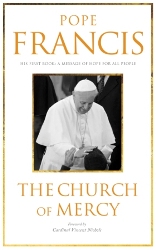Now to be published at the end of March, Pope Francis’s first major book in the English language ...
It is only a year since Pope Francis began his pontificate but his pastoral plans for the Church seem already very well defined. From the start his words, gestures and decisions have clearly shown the style and direction he intends his teaching magisterium to have. As time has gone by his vision has extended and consolidated, opening up new horizons for the life of the Church. In the apostolic exhortation Evangelii gaudium (24 November 2013) the Pope set out the main goals of his plan, thus writing the Church's ‘magna carta’ for the coming years. In its broad vision and rich content the exhortation resembles an encyclical letter. His words are all about the missionary face of the Church and, most of all, the new way of 'being Church' the Pope would like the Church to adopt through a more authentic proclamation and witness to the Gospel by Christians.
Evidently, Francis is well aware that the Church’s poor fishermen have fragile boats and much-mended nets and that, despite their efforts, they are often not able to catch anything. This is what he reminded the Brazilian bishops of in the Document of Aparecida (27 July 2013). Since God's will underlies everything, he also knows well that the strength of the Church doesn't depend on its members and their capabilities, because they are both weak and inadequate. Rather its strength 'is hidden in the deep water of God, where it is summoned to cast its nets'.
How these nets should be cast is the focus of Francis's apostolic preaching and mission. This collection of papers is fundamentally the framework that defines the pastoral and ecclesial programme. The keyword of his programme, which signposts the way, is sealed in the title: mercy. Indeed Francis's Church wants to be recognised first of all as the house of mercy which, between human weakness and God's patience, welcomes and helps to find the ‘good news’ of the great Christian hope. Whoever reaches this house and surrenders to God's mercy will not only cease to feel lonely and abandoned but will also discover a fuller existence, lit up by faith and the love of the living God – Christ who died, rose again and now is alive in his Church. Whoever meets him and stays with him learns the grammar of a Christian life and, first of all, the need for forgiveness and reconciliation, for brotherly and sisterly love, which Christians must spread in the world as joyful witnesses to God's mercy. Not only do they need to show understanding and sympathy, and remain close to those who endure moral or physical sufferings, but they also need to become people who truly and deeply bear others' pains and difficulties with the greatest tenderness, magnanimity and solidarity, and to be people who offer solace, hope and encouragement to keep on walking on the path of the Lord of life.
The good news of Christianity is Christ himself. His words give salvation and life because he is shelter and life. In the Church people believe in this truth of faith and all who adopt it as the fullness of the sacramental life find their direction and support to live as Christians, whose goal is holiness. The steps towards this finishing line are listening, proclaiming and witnessing to the Gospel. According to Pope Francis's theology, full-time Christians don't sit down to admire their faith in the reflection of a mirror nor talk about it over dinner, but they come out of themselves, embrace their cross with courage and walk the streets to share with everybody the joy of the Gospel. Pope Francis never gets tired of telling everyone that evangelising is conversion, coming out and walking. The first to be summoned are the priests, 'anointed to anoint', whose duty is to welcome and to serve. They are asked not to be afraid to go to the furthest boundaries and outskirts of human existence to meet the poor, the marginalised and the least.
Those who are materially, spiritually and humanly poor are not the focus of special attention because of being an economic, social or pastoral problem, but because the loving God, poor among the poor, reserved for them a privileged place in Christ's life and ministry. The 'poor Church for the poor' of Pope Francis is a principle that defines in an evangelistic sense the choice of poverty and service to the poor, thus continuing the wonderful story of a loving Church that throughout the centuries has been a way to liberation, inclusion and promotion for the poor, following Christ's idea of liberty and love. Christ indeed offers not only generous, practical and constant solidarity but he also actively affirms human dignity, pursues justice and builds a civilisation which is effectively 'human'.
In this context of pastoral vision for the Church, Pope Francis's idea of human beings in relation to society is embedded. His distinctive emphasis runs parallel and interacts with the rest. His strong and direct speech shakes consciences to strike the 'hardened' heart of a society whose culture is not open to the idea of coming together for the common good. These are the premises for a neighbourly and peaceful existence. It is not possible to move forward towards a better world until such idols as power, money, corruption, careerism, selfishness, indifference or, to sum up, 'the spirit of the world' are demolished.
These concepts are also clearly explained in Evangelii gaudium, which reveals to us both the bad habits that need to be abandoned and the pastoral priorities in the public life of the Church. In this effort the Pope leads the way by word and sets the pace, which quickens day by day. His aim is to let people understand that an authentic Christianity, faithful to the spirit of the Gospel, is not achievable if the people in Christian communities have a weary and half-asleep faith, without any thrill of excitement, a faith shut up within the walls of their hearts or church buildings. This is the danger that might materialise if the Church grows old and accustomed to caring only about itself rather than flinging open its doors and facing the challenges of the world. It doesn't matter if the Church sometimes fails on the way. This is why Francis keeps sending out warnings that heavy-handedness, intransigence, hypocrisy and other shortcomings need to be abolished because they undermine Christian credibility. He is determined to reform and renew the Church so that it becomes better equipped to pursue its goals, with all that that involves.
In short, the life of the Church needs to be cleansed, renewed and revitalised. This requires an ecclesial and pastoral discernment that enables it to rediscover the essence of its missionary mandate, in the light of the Holy Spirit and with the intercession of Mary, mother of the task of proclaiming the Gospel.
This extract is taken from the Preface of The Church of Mercy: His First Major Book – A Message of Hope for All People by Pope Francis, published at the end of March by DLT.

 Follow us
Follow us Connect with us
Connect with us Pinterest
Pinterest Writers' videos
Writers' videos Instagram
Instagram




